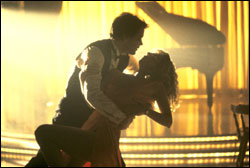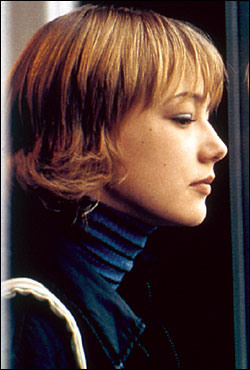There are damn few second chances for obsessions, but Francis Ford Coppola’s rerelease of his 1982 romance-with-music, One From the Heart (which runs Friday, Jan. 16, through Thursday, Jan. 22, at the Varsity), is hisand mine. What Coppola calls a “sweet little musical” had the misfortune to be his next film after Apocalypse Now, and to be nothing like any of his previous pictures, certainly not like the towering, intricate Godfathers. Whatever the rationale, the truth is that Heart was universally disliked by every reviewer across the countryexcept this one, then at The Los Angeles Times.
I don’t think the rest of the critical community was lying in wait for it, although the fact that Coppola had gleefully re-created Las Vegas down to its last blinking light bulb for this “little” movie may have reeked of hubris to those sniffing for it. There was certainly a tsunami of publicity about its new electronic technology and Coppola’s delight in using it, there on the sound stages of Zoetrope, his very own studio.
All I can speak to firsthand is that when I saw it in Westwood Village at a public screening, I loved it unabashedly. Then, in my usual understated fashion, I opened a vein and considered all the ways in which I loved it, in print. Loved the neon, loved the movie’s blatant theatricality, and especially loved Tom Waits’ score, as he and Crystal Gayle sing the thoughts and the emotions of two lovers (Teri Garr and Frederic Forrest) who quarrel on the Fourth of July anniversary of their five (unmarried) years together. (“Ah told you before, an’ ah’ll tell you again,” Waits rasps, “you don’t defrost the icebox with a ballpoint pen.”)
SOMETHING ELSE particularly intrigued me: The film seemed to be more about L.A. than Las Vegas, the L.A. punctuated with palm trees, bungalow courts and ’30s Moderne. As I wrote then, “The picture comes from the same artistic impulses that inspire air-brush art, three-dimensional pop-up greeting cards and the delicately beautiful new neon that illuminates L.A. shops.”
Yet under this hot Vegas gaudiness, there’s an air of impermanence to it, a sense that at any moment the desert could blow in and cover everything. Hardly foreign to any Angelino who has to water daily to keep the place from turning back into a grid of dry vacant lots. And if Las Vegas is a crapshoot where your future can change overnight, try Hollywood, with its game of Red Light/Green Light/Turnaround. This instability and emptiness seems to crowd the film as densely as its hundreds of extras and dozens of writhing dancers.
Finally, Coppola’s leap into years-ahead technology was sure and dazzling. As Garr and Forrest look for new loves (and find, respectively, Raul Julia and Nastassja Kinski), their faces merge, recede, and fade in and out of each other’s memories. As Kinski flirts with Forrest out in his desert junkyard, stacked rows of wrecked cars come to life with lights and music that sounds a little like a parody of the notes at the end of Close Encounters. “It’s artificial,” Coppola seemed to be saying, “Isn’t it gorgeous?”
If it was, at heart, a lithe and endearing love story, it also reveled in its surfaces. And as my review concluded, “We’ve lived among surfaces so long we’d better find them exhilarating; they’re what we have.” So I think I was as pained as Coppola was at the battering his exquisite innovation took; the difference was that he had a studio to loseand did. I had only pained silences and eye-rolling from colleagues.
FLASH FORWARD to 2003. Since he owns it, Coppola dusts off his orphaned movie, tweaks it a bit, has it remastered, and sends it back into the world via screenings at a select few festivals. (He gives a chalk-talk himself beforehand, thus guaranteeing a full house.) And for its stop at the Denver festival last October, Zoetrope, bless them, remembers the Steadfast Tin Soldier of 1982 and asks if I’ll handle an ultra-short Q&A with Francis after the screening.
Every possible emotion goes through me. Separation of critic and filmmaker? Nonsense. We’ve both been around long enough for that not to matter. No, principally panic about my normal, conversational aphasia. I’ve always loved the fact that when you read a review, there’s no way of knowing the minutes that may have drifted by between the verb and the adjective. That’s a bit more apparent on a stage.
But for the love for this movie (and, let’s face it, for the chance to chat with Coppola), I say yes. Besides, the Zoetropers have made me promise that the Q&A isn’t to run one second over 20 minutes. “He’s just in from Belize,” they tell me. “He steps off that stage and straight onto the plane for Napa. It has to be short.” I’m with them there.
So, I prepare every possible question, and for once, I’m calm. Time for the film to begin, but first, for what’s billed to me as “just a wave of his hand,” Coppola comes out to welcome this gala, expectant crowd. And they are so warm, and so expectant, that he tells them a few stories about the idea behind the production. And a tale or two about the technology. Then quite a lot about Waits and how he created the music around the screenplay. I listen in cold horror as, with charm and anecdotes, he obliterates every one of my unasked questions.
Then, as my mind races desperatelyuselesslyfor something else to ask, they project the film. Its minute changes have now made Garr and Forrest less shrill, with more to lose if their break is permanent. It’s sadly clear that this was Kinski at her zenith, while Julia’s style in his near-naked exit is so grand, he gets applause. The rest is still breathtaking, still glorious, and still the landmark it was before the digital revolution put its magic in anyone’s hands.
And afterward, on that stage, in full possession of the mike (and an enraptured audience), Francis takes off from what tattered shreds of questions I have left for him. Too much the director not to see the panic growing in my eyes, he asks that the houselights come up to half so he can see the audience, andalmost unpromptedhe rambles on seductively, expansively for 45 minutes.
Anyone remember what really happened to the Steadfast Tin Soldier? Melted down completely. And that’s the hubris of “a little chat with Coppola.”








